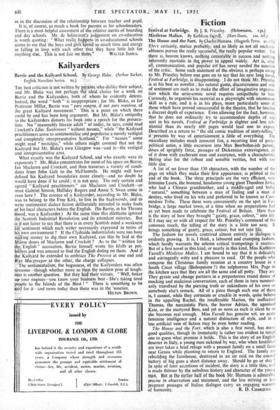Kailyarders
THE best criticism is not written by pitsOns who dislike their subject, and Mr. Blake was not perhaps the ideal choice for a work on Barrie and the Kailyarders, both of whom he evidently detests. Indeed, the word " both " is inappropriate ; for Mr. Blake, as for Professor Millar, Barrie was "pars tnagna, if not pars maxima, of the great Kailyard movement." This is a point on which there could be and has been long argument. But Mr. Blake's antipathy to the Kailyarders distorts his bopk into a speech for the prosecu- tion. No "reasonably literate adult" of today, he says, could read Crockett's Lilac Sunbonnet "without nausea," while "the Kailyard practitioners arose to sentimentalise and popularise a merely vestigial and Completely unrepresentative Scotland." For " nausea " some might read "nostalgia," while others might contend that not the Kailyard but Mr. Blake's own Glasgow was—and is—the vestigial and unrepresentative area. What exactly was the Kailyard School, and who exactly were its exponents ? Mr. Blake concentrates for most of his space on Barrie, Ian Maclaren and Crockett, and then traverses a variety of candi- dates from John Galt to the McFlannels. He might well have defined his Kailyard boundaries more closely—and no doubt he would have done if he could ; it is not easy. The only certain and agreed "Kailyard practitioners" are Maclaren and Crockett—or must Gabriel Setoun, Halliday Rogers and Annie S. Swan come in even here ? The essence of a Kailyarder, according to Mr. Blake, was to belong to the Free Kirk, to live in, the backwoods, and to write sentimental dialect fiction deliberately intended to make fools qf his local characters before the English. (So Barrie, in his Thrums tOod, was a Kailyarder.) At the same time this dilettante ignored the Scottish Industrial Revolution and its attendant miseries. But isy not fairer to say that there is in every Scottish mind a weakness 4oir, sentiment which each writer necessarily expressed in terms of ht.x own environment ? If the Clydeside industrialists were too busy risking money to dig their own Kailyard, can this be laid at the Manse doors of Maclaren and Crockett ? As to the "written for
e! English" accusation, Barrie himself wrote his Idylls as pot- Oilers and was amazed to find the English doting on them. And if tIie Kailyard be extended to embrace The Provost at one end and liff,ke Macgreegor at the other, the charge collapses.
‘ The sentimentalism, the bogusness, of the Kailyarders was often reesomethough whether more so than the modern pose of tough- dès another question. But they had their virtues. "Well, tinker up your engines—you know your business best—She's taking tired lieople to the Islands of the Blest ! " There is something to be
id for it—and more today than there was in the 'nineties.
HILTON BROWN.


































 Previous page
Previous page